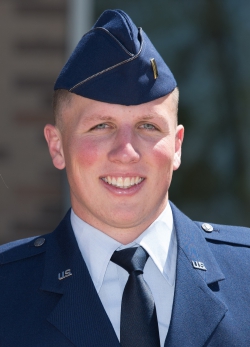Grit and Gratitude
PROVO, Utah – Jun 12, 2019 – For what feels like the hundredth time that day, BYU Marriott AFROTC cadet Jason Draper, dressed in full uniform and carrying a fifty-pound pack, runs in dirt, mud, gravel, and snow. He doesn’t know how far he’s going or when he’ll stop. All he knows is to keep going—as fast as he can. This training is known as selection—a week of intense, nonstop training necessary to become a combat rescue officer—and Draper of Palm Bay, Florida, has been determined to attend selection since his first day in the ROTC program.
“I always felt drawn to the military,” says Draper, currently a senior studying computer science, who joined BYU AFROTC his freshman year. On Draper’s first day of class, he found direction by flipping through a textbook outlining different jobs in the Air Force. “I saw the words combat rescue officer and was intrigued by the description,” he says. “It read, ‘one of the most challenging jobs in the Air Force.’”
Combat rescue officers are commissioned officers who parachute and scuba dive into dangerous situations to rescue the injured and endangered. “I knew that in this role I would positively impact people's lives,” Draper says. “The thought of potentially bringing soldiers back to their families, being able to make a real difference, definitely appealed to me.”
Combat rescue officer training is one of the most intense in the military, so the number of soldiers, sailors, and airmen who make it into selection is few. Only twenty to thirty candidates are invited from across the nation, Draper notes. Selection training is composed of running, swimming, and calisthenics exercises that progressively get harder and harder—to the point where many candidates quit. Typically, two-thirds of the participants drop out, and less than half of the remaining are chosen to move on. “The instructors want to see who you become,” Draper says. “They're trying to strip you away and get to your character.”
After two years of training with BYU AFROTC, Draper was chosen to attend selection. He carried loads of logs up rocky terrains and swam in full uniform with a sixteen-pound belt, but Draper says the hardest part of selection was how everything adds up each day. “I just kept thinking about how people have been through much worse serving our country though,” he says. “Thinking about something that matters is way better than feeling sorry for yourself.”
At the end of the week, the culminating event is a timed, eight-mile run and six-mile ruck, with the ruck featuring the addition of a fifty-pound pack. “And what keeps it interesting,” Draper says, “is that you go an unknown distance and have to make it back in an unknown time. So you just have to go as fast as you can.”
Draper completed the selection week but was asked to attend selection again the following year before a decision would be made. After Draper’s second round of selection training, he was chosen to become a combat rescue officer. “Finally being selected was amazing—just a dream come true. I knew I had worked for this, but I also felt extremely lucky,” he says.
Unfortunately, Draper didn’t pass the vision test in a medical examination after selection. Though he is heartbroken to be disqualified for service as a combat rescue officer, he looks to his future in an alternative position in the Air Force with excitement and hope.
Draper attributes his success in the combat rescue officer selection process to the character development he experienced in the ROTC program. The program has three core values: service before self, integrity first, and excellence in all you do. “Those values are stressed on a constant basis, and that impacts the culture,” Draper says. “We constantly strive to incorporate all three of them in our actions. We have a huge mentality of putting others first.”
Despite setbacks, Draper’s experience has prepared him to make an impact in the world in any career. “I’m going in a new direction,” he says, "and I’m grateful for the experiences I’ve had. Who I am and what I’ve accomplished is a result of a culture of service before self, integrity, and excellence. I definitely wouldn't have made it anywhere that I have on my own.”
Media Contact: Chad Little (801) 422-1512
Writer: Erika Magaoay




